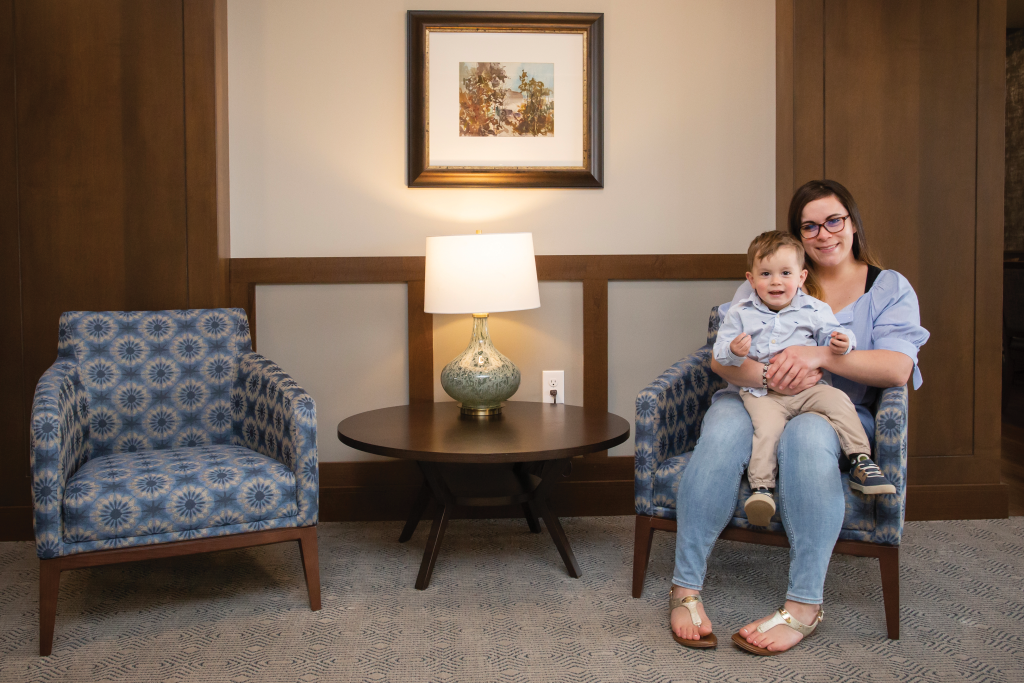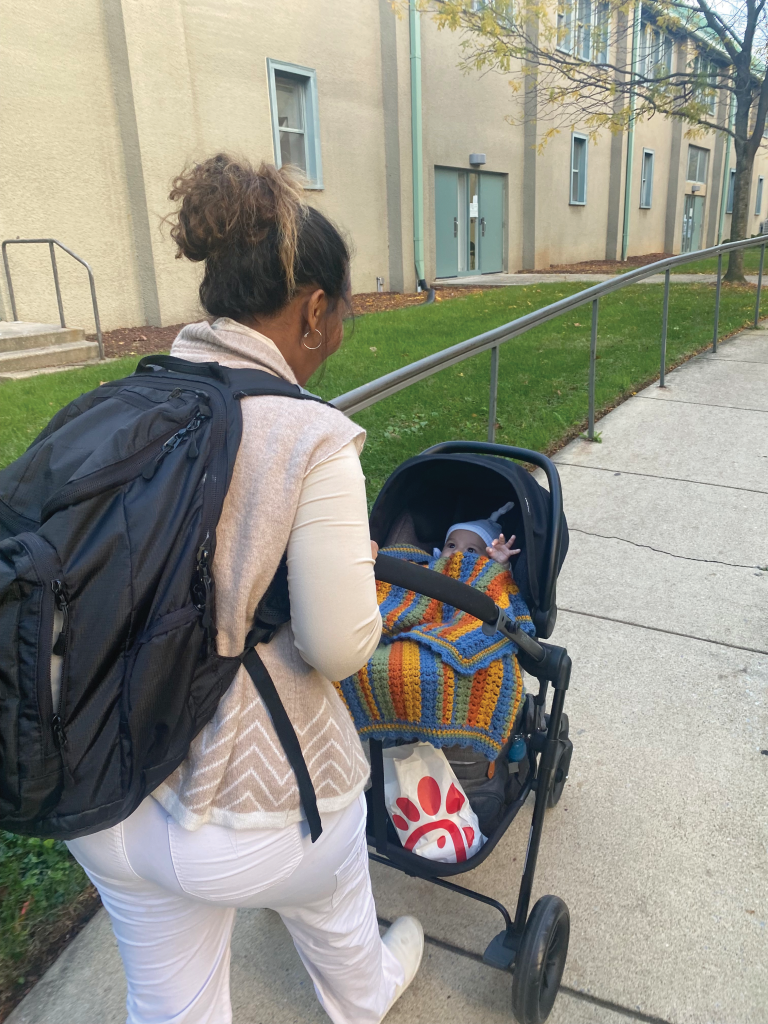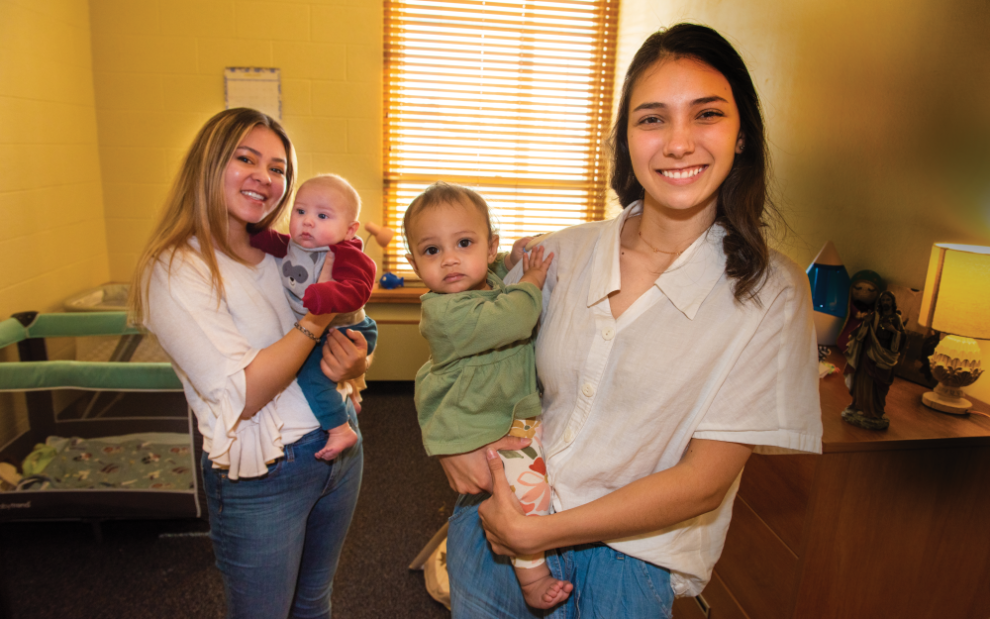Two weeks after University of Mary sophomore Katie arrived in Rome for her study abroad program, she learned she was pregnant. “I had absolutely no idea who to ask for help or what I would even say,” she says.
Ultimately she went to a residence director and was met with, “Congratulations!” Yet neither Katie nor the residence life team knew if she could return to school until they learned about a new program called the St. Teresa of Calcutta Community for Mothers, which provides housing for single mothers and their children.
Now Katie and her daughter live on a dorm floor dedicated to mothers and children. Her daughter receives child care from volunteers while Katie pursues her degree in social work. “I wasn’t sure if I could actually raise a child while going to school,” Katie says. “But I was blown away by how supportive everyone has been.”
A cloud of confusion
Katie’s story demonstrates the confusion students may feel when facing an unplanned pregnancy. In 2022, FemCatholic did an investigation into the resources available to pregnant and parenting students at Catholic colleges. FemCatholic contacted more than 180 Catholic colleges in the United States and spoke to 11 women who had been pregnant while in college. Out of the 29 schools that responded, 10 had a clear policy specific to pregnant and parenting students, five had a pregnancy support advocate, and five offered a pregnancy resource center.
Students are often unaware of resources, even when campuses have them. In 2008, Feminists for Life published the results of a nationwide survey of college students that concluded that “basic resources often go unpublicized, and students remain unaware of the services available in the event of an unplanned pregnancy.” More recently, only 33 percent of the respondents to a 2021 poll by Students for Life remember seeing any resources for parenting or pregnant students advertised on campus.
These findings are consistent with those of the Guadalupe Project, a Catholic University of America (CUA) study of its own policies toward pregnant and parenting members of the community. Prior to the Guadalupe Project, the only way students could get the school’s pregnancy resource packet was if they disclosed their pregnancy to a campus minister. Larissa York, an intern with the project, spoke with about 30 students who could potentially become pregnant. Other than the fact that they could get a pregnancy test from student health services, “they did not know anything about resources available to them,” York says.
Not all Catholic schools provide support to pregnant students. York recalls two acquaintances—one at a Catholic college and another at a Protestant college—who were strongly encouraged to withdraw when they became pregnant. “To have friends who went to youth group and served on mission trips with me, for them to end up in this kind of situation, and some of them to have the fear of the religious connotation with it . . . is heartbreaking,” York says.
The Guadalupe Project found that students were unsure of what CUA’s response would be to a pregnant, unmarried student. York knew their resources needed to be better advertised.
“The committee was made aware of widely shared concerns that an unmarried pregnant student might face some disciplinary action, even up to being made to leave the University, on account of her pregnancy,” the project’s report states. To address this concern, the report states plainly that “unmarried students who become pregnant (or are fathers of an expected child) will not face disciplinary action, but will be met with love.”
Jennie Lichter, CUA’s deputy general counsel and the chair of the Guadalupe Project committee, says that “one measure of success [in the Guadalupe Project] would be having more students who are pregnant here.” For many schools, however, the reality of pregnancy on campus is simply not on their radar. Of the 29 Catholic colleges that responded to FemCatholic, only 16 reported being aware of any pregnant students on their campus in the past year.
Being unaware of pregnant students doesn’t mean they’re not on campus. A 2008 study from the Cardinal Newman Society for Catholic Education showed that 46 percent of students surveyed had engaged in sexual activity. Even in the unlikely scenario that all those students used some form of contraception, there would be a few for whom it failed, resulting in pregnancy. So where are the pregnant students?
Many of them probably have abortions. According to 2014 data from the Guttmacher Institute, 34 percent of abortions in the United States were among women between 20 and 24.
Maggie Mazanowski, who became pregnant during her senior year at the Franciscan University of Steubenville, recalls the first month of her pregnancy as a lonely time. “To live in that darkness for a month and not share it with people . . . it makes you much more vulnerable to choose the wrong option,” she says.
Later she learned that the previous year a student had become pregnant and chosen abortion. Another student told Mazanowski she had strongly considered abortion but seeing Mazanowski continue her pregnancy and graduate inspired her to make the same choice.
Some women drop out of school before disclosing their pregnancy. Mazanowski considered this for several reasons, but she finally decided to tell her social work professor about her pregnancy. “I was like, ‘I’m scared to tell you this, because I don’t know how you are going to take it,’ ” Mazanowski says. “I had those fears because we were at a Catholic school.” It was largely her professor’s positive response that encouraged her to stay in school and graduate.
But pregnancy is only the beginning of the challenges single mothers face. According to the Institute for Women’s Policy Research, only 28 percent of single mothers complete their degree within six years. Sixty-three percent of single mothers in college live at or below the federal poverty level. The majority spend at least 30 hours per week caring for children and work a job at least 20 hours per week on top of their studies.
A handful of Catholic schools do stand out as providing creative solutions for mothers and children. The longest-standing programs are at schools founded by religious sisters and designed to serve women, but other Catholic colleges are also coming up with ways to help single parents.

Designing a solution
In the 1980s, members of the faculty and staff at St. Catherine’s University in Minnesota noticed that single-parent students were dropping out. In 1993, the school, which was founded by the Sisters of St. Joseph of Carondelet and still has an all-women undergraduate college, began its Access and Success Office to serve single parents. Today the office has a staff of three social workers and houses a child-friendly study space.
Access and Success advocated for the school’s pregnant and parenting students policy, which was implemented in 2019 and ensures that all students are aware of their rights while pregnant or parenting. “We were seeing over and over again that a student would come to us and say, ‘I had to miss [class] because I had an OB appointment, or I had such bad morning sickness I couldn’t go to class, and my professor is saying they have to rely on their attendance policy and dock points for my grade,’ and we would inform them, ‘No there is a policy under Title IX that prevents that,’ ” says Beth Hamer, director of Access and Success.
At the College of St. Mary in Nebraska and at Misericordia University in Pennsylvania, the Sisters of Mercy responded to pregnant and parenting students by founding housing programs.
In the late 1990s, Misericordia University, which was founded in 1924 to educate the impoverished daughters of coal miners and became coeducational in the 1970s, noticed that many qualified accepted female applicants were choosing not to attend. “The common denominator was that they were single mothers,” says Katherine Pohlidal, the director of the school’s Bourger Women with Children Program, which was founded in 2000. Because the cost of rent made tuition payments impossible for single mothers, the Sisters of Mercy launched a program to provide free housing at Misericordia. At the encouragement of Sister of Mercy Jean Messaros, the school’s now-retired vice president of mission integration, the sisters donated a house where women and children could reside.
At the College of St. Mary, which remains all-women in its undergraduate college, the need of one pregnant student inspired the Mothers Living and Learning Program. In the spring of 2000, that student told the school’s president, Sister of Mercy Maryanne Stevens, that she was going to have a baby and wasn’t sure she could finish school. By fall, the Mothers Living and Learning Program was born. “Mercy responds to need. The College of St. Mary was really founded on that—response to need—and I’ve thought a lot about that over the time I’ve been president,” Stevens says. “A lot of times people say, ‘You are such a visionary,’ and I say, ‘No, all we are doing is responding to need.’ ”
Partially inspired by Mothers Living and Learning at the College of St. Mary, Mount Mary University in Wisconsin, which also remains all-women in its undergraduate college, launched a program in December 2021. The university houses single mothers and their children in their Trinity Woods complex alongside retired members of their founding order and other adults in independent and assisted living. Mothers pay $1,200 per month for a furnished two-bedroom apartment, meal plans, utilities, parking, and laundry. The ground level of the building has a day care.
Maggie Bowen had her associate degree and was working as a paraprofessional for Milwaukee Public Schools around the time her son was born. The working conditions got bad during the pandemic, and she decided to check out Trinity Woods. “I don’t think I would have really considered [going back to school] if I didn’t have this opportunity,” Bowen says.
These programs provide other services to single mothers, too. The College of St. Mary offers a “Successful Single Mother” course that discusses financial literacy, healthy relationships, emotional intelligence and regulation, and restorative justice. Mothers in the program can send their kids to the on-campus early childhood development center for free.
At Trinity Woods, Hannah Sternig, Mount Mary’s director of student life, works with a social worker to help mothers sign kids up for school, find jobs, and navigate health insurance. She also plans community-building gatherings. The program has a “Madonna Fund” to help students with medical bills, housing, tuition, child care, or utilities.
Misericordia’s Women with Children program, which serves women living at or near the poverty level, provides perhaps the most comprehensive services. In addition to free, year-round housing in one of the program’s houses, the women receive free books and academic supplies, scholarships, meal plans, and emergency funds for car repair and insurance. The program’s staff also helps women access subsidies for child care and food stamps. The university gives mothers in the program priority for work-study placements to help them meet the 10 hours per week work requirement for these services.
As of the 2021–22 academic year, 42 families have graduated from the Women with Children Program, with 100 percent professional placement. Since 2013, 80 percent of graduates have achieved a master’s degree or higher. Sister Messaros has heard from graduates whose children have now gone on to college, actualizing the hope that this would be a two-generational program.
Kristi Hernandez, a 42-year-old mother of two, applied to the program after taking four years to get her associate degree due to financial strain and the stress of navigating the relationship with her son’s father, who was in active addiction. Hernandez says she and the other woman she lives with act like coparents, helping with one another’s children and doing things like providing rides if someone’s car breaks down or sharing dinner if they have extra.
“If something is going on with me or with my children, I can call and I have this community of women who understand exactly what it is I am going through,” says Hernandez. “Whoever’s got an easier load will step in and say, ‘I can do this for you today.’ When they say it takes a village, I feel like we have the most unique, special village here in this program.”
Since 2013, MiraVia, a nonprofit Catholic organization, has been providing homes on the campus of Belmont Abbey in North Carolina to parents attending any college in the area. Residents receive housing, child care, three meals per day, life skills classes, and professional case management, all free of charge.
More recently, CUA and the University of Mary in North Dakota launched their own efforts to serve pregnant and parenting students. At the University of Mary, a young couple approached the school’s leadership about starting a program to support mothers on campus. Jerome Richter, the school’s executive vice president, remembers the couple said to him, “We are going to the March for Life and we support crisis pregnancy centers, but what are we doing as a university for these young ladies who find themselves in a situation that they didn’t anticipate?” After the school raised $1.25 million to launch the St. Teresa of Calcutta Community for Mothers, the first two residents moved into the dorm in spring 2023. Each mother in the program receives free room and board as well as child care.
Fostering a whole-life support system
Stevens recalls that when she first started the Mothers Living and Learning Program at the College of St. Mary, she received pushback from people who didn’t understand why she was “rewarding” women for conduct they didn’t approve of. “I said, ‘This is what pro-life is. This is what it means to be pro-life,’ ” Stevens says.

CUA’s Guadalupe Project is an example of how Catholic schools that want to serve pregnant and parenting students could begin the process. Starting in the summer of 2022, the committee spoke to faculty, staff, and undergraduate and graduate students and researched what other institutions were doing. Then, in October 2022, they released a report of their findings with commitments to address gaps in their resources. Those commitments fell into three “spheres for growth”: improvement to family-friendly policies, adjustments to the school’s physical resources, and enhancement in campus culture.
When Maria Amare became pregnant while at CUA in spring 2022, she searched the school’s web page to see what housing resources were available for her and her child. All she found was a pregnancy nondiscrimination clause and a page about parenting faculty. Thanks to the Guadalupe Project, however, the school now has a new web page designed to convey support and access to resources. In addition, the school began a poster campaign that includes a QR code for pregnancy resources; they also updated their pregnancy resource booklet, making it available online and giving it out with every free pregnancy test at student health services. The committee made some long-term commitments as well, including developing scholarships for mothers, creating a pregnancy resource coordinator staff position, and exploring housing possibilities.
Each Catholic school that offers housing for mothers and children has a specific age range for the children they serve. The programs at the College of St. Mary and Mount Mary have age ranges of 6 weeks to 10 years old and 6 weeks to 11 years old, respectively. Both programs expressed a willingness to evaluate situations on a case-by-case basis, however.
At MiraVia and the University of Mary, women move into housing while pregnant and can remain there until their child turns 2 or 4, respectively. Debbie Capen, executive director of MiraVia, says this age bracket is legally required. If the nonprofit wants to house pregnant women, it must be licensed as a maternity home, which prevents it from allowing postnatal women to move in. MiraVia asked for a waiver from the law that a woman can only stay until the child turns 1 but only got the law extended to age 2.
On the other end of the spectrum, the Women with Children program at Misericordia accepts women whose children are between the ages of 2 and 8 (and no older than 12 when the mother graduates). Pohlidal, the program’s director, says this is due to liability concerns: It is more manageable to safely provide for children over the age of 2, and the program doesn’t want to house younger children with adolescents.
Schools hoping to start similar programs have many challenges to navigate—but the directors of existing programs are ready and willing to help other schools serve women and children. “What we do is not rocket science,” says Capen. “If they have the physical space, we can come in with the programming and fundraising to make it happen.”
As the MiraVia website affirms, offering single mothers care and support is a “Christ-centered approach.” The colleges that are finding ways to do this are not only helping young families move toward a new life of “hopeful, independent, and healthy living”; they are also educating the broader community on what a true “culture of life” involves.
For more on Catholic campus life:
- At community colleges, an untapped opportunity for ministry
- Anti-racism is part of Catholic identity on these campuses
- Young people are leading a new approach to campus ministry
This article also appears in the December 2023 issue of U.S. Catholic (Vol. 88, No. 12, pages 10-14). Click here to subscribe to the magazine.
Header Image: St. Teresa of Calcutta moms Angelina and Katie with their babies. Photo courtesy of the University of Mary.













Add comment